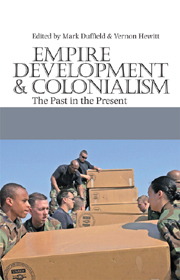Book contents
- Frontmatter
- Contents
- Acknowledgements
- Notes on Contributors
- Introduction
- 1 The Exceptional inclusion of ‘Savages’ & ‘Barbarians’
- 2 Empire, International Development & the Concept of Good Government
- 3 Empire: a Question of Hearts?
- 4 ‘Conflict-Sensitive’ Aid & Making liberal Peace
- 5 Development, Poverty & Famines
- 6 Plain Tales from the Reconstruction Site
- 7 The International Politics of Social Transformation
- 8 Liberal Interventionism & the Fragile State
- 9 Freedom, Fear & NGOs
- 10 Theorising Continuities between Empire & Development
- 11 Spatial Practices & Imaginaries
- 12 Decolonising the Borders in Sudan
- 13 ‘Individualism is, Indeed, Running Riot’
- Index
1 - The Exceptional inclusion of ‘Savages’ & ‘Barbarians’
The Colonial Liberal Bio-Politics of Mobility Development
Published online by Cambridge University Press: 05 February 2013
- Frontmatter
- Contents
- Acknowledgements
- Notes on Contributors
- Introduction
- 1 The Exceptional inclusion of ‘Savages’ & ‘Barbarians’
- 2 Empire, International Development & the Concept of Good Government
- 3 Empire: a Question of Hearts?
- 4 ‘Conflict-Sensitive’ Aid & Making liberal Peace
- 5 Development, Poverty & Famines
- 6 Plain Tales from the Reconstruction Site
- 7 The International Politics of Social Transformation
- 8 Liberal Interventionism & the Fragile State
- 9 Freedom, Fear & NGOs
- 10 Theorising Continuities between Empire & Development
- 11 Spatial Practices & Imaginaries
- 12 Decolonising the Borders in Sudan
- 13 ‘Individualism is, Indeed, Running Riot’
- Index
Summary
Introduction
This chapter addresses mid-nineteenth-century British liberalism as it engaged with the crisis of the Morant Bay rebellion (1865), following the ‘great experiment’ of emancipation in the British colony of Jamaica from 1833 onwards. The chapter uses that legacy to reflect upon limits of liberal government in the pursuit of security and the facilitation of freedom, including freedoms of mobility and the facilitation of developmental capabilities. While it is primarily concerned with the partial extension of liberal government to the post-emancipation population of Jamaican-African peasants in the period 1833–1865, the concluding section reflects on the legacy of this phase of liberal-colonial government for the contemporary framing of ‘southern populations’.
In focusing on emancipation and rebellion in Jamaica, I am concerned with the British government's extension of liberal ‘tuition’ to Jamaican subjects, where Britain attempted the incorporation of ‘surplus population’ within the free yet disciplined realm of liberalism. In conceptualising the Jamaican population in terms of surplus population, I am following political economy and developmental paradigms belonging to the nineteenth-century (Cowen and Shenton, 1996: 150–3). The term ‘surplus’ refers to the way in which the freed women's and men's migration from the agricultural-and-industrial plantation system to small-holding was surplus to the requirements of a profitable land-labour ratio in the colonies, and constitued a ready supply of cheap labour (Wakefield, 1834). Here Marx's taxonomy of floating, latent and stagnant labour is relevant in the domain of political economy (Marx, 1928:711).
- Type
- Chapter
- Information
- Empire, Development and ColonialismThe Past in the Present, pp. 16 - 29Publisher: Boydell & BrewerPrint publication year: 2009



